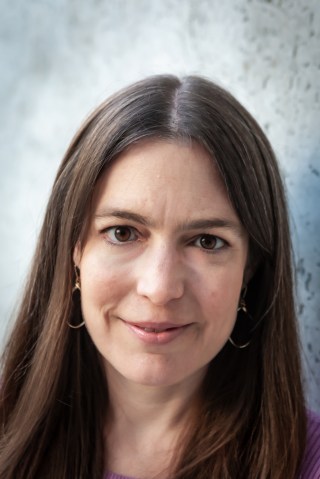The 2023 Akron Poetry Prize competition is still underway! While we will continue to accept submissions through June 15, 2023 by 5 pm, we invite you to get to know our final judge, Sandra Beasley.

Sandra Beasley is the author of four poetry collections—Made to Explode, Count the Waves, I Was the Jukebox, which won the 2009 Barnard Women Poets Prize, and Theories of Falling—as well as Don’t Kill the Birthday Girl: Tales from an Allergic Life, a disability memoir and cultural history of food allergies. She served as the editor for Vinegar and Char: Verse from the Southern Foodways Alliance. Honors for her work include the 2019 Munster Literature Centre’s John Montague International Poetry Fellowship, a 2015 NEA fellowship, and six DC Commission on the Arts and Humanities fellowships. She lives in Washington, DC.
Recently, Sandra caught up with Brittany LaPointe, Marketing, Outreach & Publishing Services Coordinator for the University of Akron Press, to talk truth and poetry.
What drew you into reading and writing poetry?
I was taught by Rose MacMurray, known as “The Poetry Lady” of Fairfax County Public Schools for many years, and nurtured tremendously by various teachers at Spring Hill Elementary School, Haycock Elementary School, Longfellow Middle School, and Thomas Jefferson High School for Science and Technology. We’re in a cultural moment where the programming of K-12 schools, particularly public schools, is under invasive threat. Teachers need and deserve intellectual freedom, as well as sustained funding and a beyond-mere-living wage; in the absence of these resources, creative writing and the arts are quick to suffer.
Who are your biggest influences?
Poets are sponges! We’re influenced by everything: a scientific breakthrough, a street scene, a jazz set, a video of capybaras, the meal we just ate, an episode of television. Alternately: Rita Dove, one of my many incredible undergraduate teachers at the University of Virginia, models what it means to be a brilliant writer while also serving as an international ambassador and curator for poetry. Also: I am regularly moved by the visual arts because I live in Washington, D.C., a city with a terrific museum culture. My husband is a painter. My mother is a painter.
Your poetry often employs repetition in meaningful ways; how much attention do you give repetition while reading another poet’s work?
I am highly attentive to structure, which Gregory Orr—another beloved UVA mentor—might describe as one of the “four temperaments” of the poem. Anaphora and iterative syntax are always a delight to encounter on the page. Sprawl and unspooling can be powerful tools, as well; my only caveat is that I’m wary of over-enjambment, which is a pervasive quality of late 20th C./early 21st C. American poetics. One of my MFA mentors at American University, Henry Taylor, described it as the “kudzu” of the page. I’ve never shaken that association.
What are you currently reading?
What’s literally in my traveling bag, right now? Standing in the Forest of Being Alive: A Memoir in Poems, by Katie Farris; Easy Beauty: A Memoir, by Chloé Cooper Jones. Plus students’ work.
What gets you writing; what are you favorite prompts?
Selfishly, the act of reading is what gets me writing. For years, I said I wasn’t a “prompt” person, and I even left several writing groups because of my resistance to them. What I’ve realized since then is that the prompts that work for me are highly formal: a golden shovel, a set of sestina endwords, a series of poems using the Traveler’s Vade Mecum for title conventions, and so on. Sure, they are idiosyncratic, but they are still “prompts” at the end of the day. As a teacher, I’ve witnessed the irrefutable value of prompts. I shouldn’t have been so grumpy about them early on.
How do you think growing up in Virginia has influenced your writing?
There is no disentangling of “where” I grew up from “how” I grew up. I love Virginia, and I am troubled by Virginia, and I spent eight years in the figurative educational shadow of Thomas Jefferson. This is a much larger conversation, but the home region of my first 20 years sits at such a peculiar tipping place between identifying as the “Northern” or “Southern” United States. Where I have chosen to live for my subsequent 20 years—Washington, D.C.—has its own odd relationship to being the “nation’s capital” versus an independent and deeply Democratic city.
Is there anything you’d like us to know about how you’ll approach judging the 2023 Akron Poetry Prize?
I am open to any style, as long as I can discern intentionality and risk in the work. I won’t just read your “first ten pages”; I’ll embrace the whole of the manuscript, valuing richness of ideas over technical perfection. And, as someone who has been in these same contest trenches, I’m honored that you would trust me with your poems.